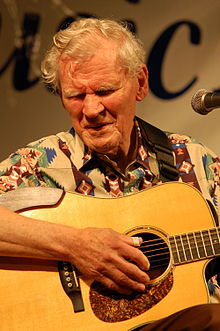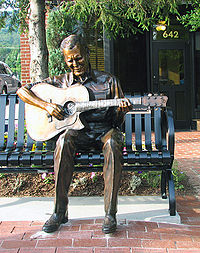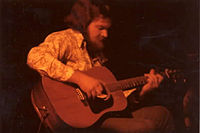- Doc Watson
-
Doc Watson 
Doc Watson at Sugar Grove Music Festival in 2009Background information Birth name Arthel Lane Watson Also known as Doc Watson Born March 3, 1923
Deep Gap, North Carolina USGenres Blues, bluegrass, country, folk, Gospel Occupations Musician, Singer-Songwriter Instruments Vocals, guitar, banjo, harmonica Labels Folkways, Vanguard, United Artists, Flying Fish, Sugar Hill Arthel Lane "Doc" Watson (born March 3, 1923) is an American guitar player, songwriter and singer of bluegrass, folk, country, blues and gospel music. He has won seven Grammy awards as well as a Grammy Lifetime Achievement Award. Watson's flatpicking skills and knowledge of traditional American music are highly regarded. He performed with his son Merle for over 15 years until Merle's death in 1985, in an accident on the family farm.[1][2][3]
Contents
Biography
Watson was born in Deep Gap, North Carolina. According to Doc on his three CD biographical recording Legacy, he got the nickname "Doc" during a live radio broadcast when the announcer remarked that his given name Arthel was odd and he needed an easy nickname to go by. A fan in the crowd shouted "Call him Doc!" presumably in reference to the Sherlock Holmes sidekick Doctor Watson. The name stuck ever since.[4]
An eye infection caused Doc Watson to lose his vision before his first birthday. Despite this, he was taught by his parents to work hard and care for himself. He attended North Carolina's school for the visually impaired, The Governor Morehead School, in Raleigh, North Carolina.[5]
In a 1988 interview with Terry Gross on Fresh Air, Doc explains how he got his first guitar. His father told him that if he chopped down all the small, dead, chestnut trees along the edge of their field he could sell the wood to the tannery. He and his brother did the work and with the money they earned Doc bought a $10 Stella from Sears Roebuck and his brother bought a new suit of clothes.[6] Later in that same interview, Watson explained that his first high quality guitar was a Martin D-18.[7]
The first song Doc ever learned to play was "When Roses Bloom in Dixieland". Doc proved to be a natural and within months he was performing on local street corners playing Delmore, Louvin and Monroe Brothers' duets alongside his brother Linny. By the time he reached his adult years Doc had become a proficient acoustic and electric guitar player.[8]
In 1947, Doc married Rosa Lee Carlton, the daughter of popular fiddle player Gaither Carlton. Doc and Rosa Lee had two children—Eddy Merle (named after country music legends Eddy Arnold and Merle Travis) in 1949 and Nancy Ellen in 1951.[5]
In 1953, Doc joined the Johnson City, Tennessee-based Jack Williams' country and western swing band on electric guitar. The band seldom had a fiddle player, but were often asked to play for square dances. Following the example of country guitarists Grady Martin and Hank Garland, Doc taught himself to play fiddle tunes on his Les Paul electric guitar. He later transferred the technique to acoustic guitar, and playing fiddle tunes became part of his signature sound.[1][9] During his time with Jack Williams, Doc also supported his family as a piano tuner.
In 1960 as the American folk music revival grew, Doc took the advice of folk musicologist Ralph Rinzler and began playing acoustic guitar and banjo exclusively.[5] That move ignited Doc's career when he played on his first recording, Old Time Music at Clarence Ashley's. He also began to tour as a solo performer and appeared at universities and clubs like the Ash Grove in Los Angeles. Watson would eventually get his big break and rave reviews for his performance at the renowned Newport Folk Festival in 1963. He recorded his first solo album in 1964 and began performing with his son Merle the same year. The pair would tour and record together until 1985 when Merle was killed in a tractor accident.[9]
After the folk revival waned during the late 1960s, Doc's career was sustained by his performance of "Tennessee Stud" on the 1972 live album recording Will the Circle Be Unbroken. As popular as ever, Doc and Merle began playing as a trio, with T. Michael Coleman on bass, in 1974. The trio toured the globe during the late seventies and early eighties, recorded nearly fifteen albums between 1973 and 1985, and brought Doc and Merle’s unique blend of acoustic music to millions of new fans.
Doc plays guitar in both flatpicking and fingerpicking style, but is best known for his flatpick work. His guitar playing skills, combined with his authenticity as a mountain musician, made him a highly influential figure during the folk music revival. He pioneered a fast and flashy bluegrass lead guitar style including fiddle tunes and crosspicking techniques which were adopted and extended by Clarence White, Tony Rice and many others. Watson is also an accomplished banjo player and in the past has accompanied himself on harmonica as well. Known also for his distinctive and rich baritone voice, he has over the years developed a vast repertoire of mountain ballads which he learned via the oral tradition of his home area in Deep Gap, North Carolina. His affable manner, humble nature and delightful wit have endeared him to his fans nearly as much as his musical talent has.
Doc played a Martin model D-18 guitar on his earliest recordings. In 1968 he began a relationship with Gallagher Guitars when he started playing their G-50 model. His first Gallagher, which Doc refers to as "Old Hoss", is on display at the Country Music Hall of Fame in Nashville, Tennessee. In 1974, Gallagher created a customized G-50 line to meet Doc's preferred specifications, which bears the Doc Watson name. In 1991, Gallagher customized a personal cutaway guitar for Doc that he plays to this day and refers to as "Donald" in honor of Gallagher guitar's second generation proprietor and builder, Don Gallagher.[10]
In 1986 he received the North Carolina Award and in 1994 he received a North Carolina Folk Heritage Award. Also in 1994, Watson teamed up with Randy Scruggs and Earl Scruggs to contribute "Keep on the Sunny Side" to the AIDS benefit album Red Hot + Country produced by the Red Hot Organization.
In 2000 he was inducted into the International Bluegrass Music Hall of Honor. In 1997, Doc received the National Medal of Arts from U.S. president Bill Clinton.[11]
In recent years, Watson has scaled back his touring schedule. As of 2007, he is generally joined onstage by his grandson (Merle's son) Richard, as well as longtime musical partners David Holt or Jack Lawrence. Recently, on June 19, he was accompanied by Australian guitar legend Tommy Emmanuel at the Bass Performance Hall. He also performed, accompanied by Holt and his grandson, Richard, at Hardly Strictly Bluegrass in 2009, as he had done in several previous years.
He is host to the annual MerleFest music festival held every April at Wilkes Community College in Wilkesboro, North Carolina. The festival features a vast array of acoustic style music focusing on the folk, bluegrass, blues and old-time music genres. It is named in honor of Merle Watson and is one of the most popular acoustic music festivals in the world, drawing over 70,000 music fans each year.[12]
In 2010, Blooming Twig Books published "Blind But Now I See" by Dr. Kent Gustavson, the first comprehensive biography of the seminal flatpicking guitarist.
Discography
Grammy awards
- 1973 Best Ethnic Or Traditional Recording (Including Traditional Blues): Doc Watson for Then And Now
- 1974 Best Ethnic Or Traditional Recording: Merle Watson & Doc Watson for Two Days In November
- 1979 Best Country Instrumental Performance: Doc Watson & Merle Watson for Big Sandy/Leather Britches
- 1986 Best Traditional Folk Recording: Doc Watson for Riding The Midnight Train
- 1990 Best Traditional Folk Recording: Doc Watson for On Praying Ground
- 2002 Best Traditional Folk Album: Doc Watson & David Holt for Legacy
- 2004 Lifetime Achievement Award
- 2006 Best Country Instrumental Performance: Bryan Sutton & Doc Watson for Whiskey Before Breakfast track from Not Too Far From The Tree by Bryan Sutton
References
- ^ a b Miller, Dan (September 1998). "Doc Watson: Flatpicking Legend". Flatpicking Guitar Magazine, Vol 2, No 6. http://www.flatpick.com/Pages/Featured_Artist/Doc.html. Retrieved 2008-11-28.
- ^ "Doc Watson Biography". Wilkes Community College. 2005. http://www.merlefest.org/DocsIntro.htm. Retrieved 2009-03-09.[dead link]
- ^ Menconi, David (2003-03-02). "Doc of Ages". The News & Observer. http://blogsarchive.newsobserver.com/beat/index.php?p=11290&more=1&c=1&tb=1&pb=1. Retrieved 2009-03-09.
- ^ Doc Watson (2002). Legacy (CD).
- ^ a b c Kaufman, Steve (1999). The Legacy of Doc Watson. Mel Bay Publications. pp. 152. ISBN 978-0-7866-3393-7. http://books.google.com/books?id=Et6zwlhPwUcC&printsec=frontcover&source=gbs_navlinks_s#v=onepage&q=&f=false.
- ^ www.npr.org. "Doc Watson". [1]. http://www.npr.org/templates/transcript/transcript.php?storyId=129579152. Retrieved 2010-09-03.
- ^ Fretbase, Doc Watson's first Martin Guitar
- ^ Country.com. "Doc Watson". Chet Atkins: Mister Guitar - Books & Bios. http://www.misterguitar.com/bios/watsonbio.html. Retrieved 2008-11-28.
- ^ a b Havighurst, Craig (June 2003). "Living Legacy". Acoustic Guitar magazine. http://www.acousticguitar.com/issues/ag126/feature126.html. Retrieved November 20, 2009.
- ^ Callow, John (January 1997). "Gallagher Guitars". Flatpicking Guitar Magazine, Vol 1, No 2. http://www.gallagherguitar.com/flatpickart.html. Retrieved 2008-11-28.
- ^ Lifetime Honors: National Medal of Art, National Endowment for the Arts.
- ^ http://www.journalpatriot.com/fullstory.asp?id=1491
External links
- Doc's Guitar : A site dedicated to the guitar and music of Doc Watson
- Podcast of Doc Watson and Jack Lawrence performing live at the 1996 Florida Folk Festival from the Florida Folklife Collection (made available for public use by the State Archives of Florida)
- Live 1977 recording of "The Cuckoo Bird" by Doc and Merle Watson from the Florida Folklife Collection (made available for public use by the State Archives of Florida)
- Live 1996 recording of "Shady Grove" by Doc and Jack Lawrence from the Florida Folklife Collection (made available for public use by the State Archives of Florida)
- MerleFest
- MerleFest official website
- "Doc's orders: No heavy metal at MerleFest" 2007 article in the Hook weekly
- National Public Radio
- Prairie Home Companion
- Doc Watson & Taj Mahal August 9, 1986 (db.etree.org)
- October 23, 1999
- February 14, 2004
Article on Doc Watson and other western NC guitar players [2]
Categories:- 1923 births
- American banjoists
- American bluegrass guitarists
- American bluegrass musicians
- American blues guitarists
- American blues singer-songwriters
- American buskers
- American country guitarists
- American country singer-songwriters
- American folk guitarists
- American folk singers
- American guitarists
- Appalachian culture
- Blind bluesmen
- Blind musicians
- Grammy Award winners
- Grammy Lifetime Achievement Award winners
- International Bluegrass Music Hall of Honor inductees
- Living people
- Musicians from North Carolina
- National Heritage Fellowship winners
- Old-time music
- People from Watauga County, North Carolina
- United States National Medal of Arts recipients
- Vanguard Records artists
Wikimedia Foundation. 2010.


